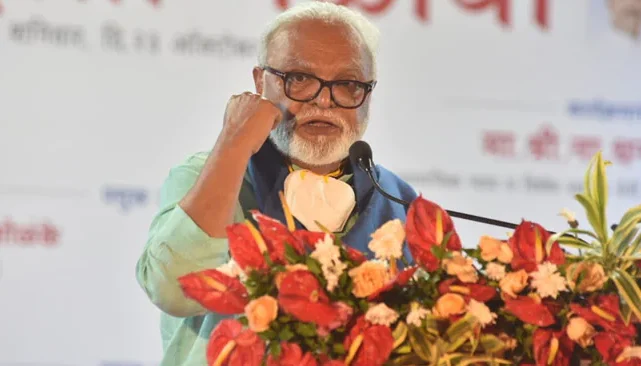
Chhagan Bhujbal’s Exclusion from Maharashtra Cabinet Sparks Political Tension
The recent cabinet expansion in Maharashtra has led to significant political turbulence, particularly within the faction led by Deputy Chief Minister Ajit Pawar of the Nationalist Congress Party (NCP). While nine ministers from the faction were sworn in, the conspicuous absence of veteran leader and former minister Chhagan Bhujbal has raised eyebrows and fueled speculation. Bhujbal’s exclusion has not only caused unrest within the party but has also brought to light broader issues of political representation and decision-making.
Bhujbal’s Political Significance and Discontent
Chhagan Bhujbal, a prominent face of the Other Backward Classes (OBC) community in Maharashtra politics, was widely expected to secure a ministerial berth in the recent cabinet expansion. However, his name was missing from the final list of inductees, leaving him visibly upset. Addressing reporters, Bhujbal candidly expressed his dissatisfaction, saying, “Yes, I am upset. You should ask those who sidelined me about the reasons.”
Following his exclusion, Bhujbal left for Nashik, skipping further discussions in Mumbai. This move was widely interpreted as a signal of his deep discontent with the party’s decision-making process. His decision to distance himself from the factional meetings has added fuel to speculation about his next political move.
Also Read: Understanding AC Repair in North Phoenix: Key Considerations and Cost Factors
A Rajya Sabha Offer Rejected
Sources within the NCP faction led by Ajit Pawar revealed that an offer was made to Bhujbal to nominate him to the Rajya Sabha as a form of consolation. However, this proposal appears to have been ill-timed and failed to address Bhujbal’s grievances. Although Bhujbal had earlier shown interest in transitioning to the Upper House, the sudden exclusion from the cabinet seems to have made the offer unappealing. His rejection of the Rajya Sabha seat has only deepened the uncertainty surrounding his political future.
Discussions with Supporters in Nashik
Bhujbal’s departure to Nashik on the day of the cabinet expansion marked a critical turning point. As the leader of the Samata Parishad, a socio-political organization championing OBC rights, Bhujbal plans to hold discussions with his supporters to determine his next steps. These meetings are expected to shed light on whether he will continue to align with Ajit Pawar’s faction or explore alternative political paths.
Opposition parties have been quick to criticize Bhujbal’s exclusion, accusing the NCP faction of sidelining him due to his OBC identity. This has raised questions about the faction’s commitment to representing the OBC community, a significant voting bloc in Maharashtra.
Broader Discontent: Ramdas Athawale and Ravi Rana
Bhujbal’s dissatisfaction is not an isolated case. Other leaders, including Bharatiya Janata Party (BJP)-supported independent MLA Ravi Rana and Republican Party of India (Athawale) chief and Union Minister Ramdas Athawale, have also expressed discontent over the cabinet expansion. These developments highlight the challenges of managing competing ambitions within the ruling coalition.
Ramdas Athawale’s Grievances
Athawale, a key Dalit leader and ally of the BJP, voiced his disappointment over not being given a cabinet berth despite earlier assurances from Chief Minister Devendra Fadnavis. Speaking to reporters in Delhi, Athawale remarked that the unfulfilled promise has left his party dissatisfied, raising concerns about the BJP’s handling of its allies.
Ravi Rana’s Resentment
Similarly, independent MLA Ravi Rana, known for his proximity to Fadnavis, was also excluded from the cabinet. Following the announcement, Rana left for his hometown of Amravati. His wife, Navneet Rana, hinted at his discontent through a cryptic social media post, although she refrained from directly naming or blaming anyone. This subtle yet pointed reaction underscores the simmering tensions within the coalition.
Implications for Maharashtra’s Political Landscape
The exclusion of key leaders like Bhujbal, Athawale, and Rana from the cabinet has significant implications for the ruling coalition’s unity and electoral prospects. Critics argue that sidelining influential leaders risks alienating their voter bases, which could prove detrimental in future elections.
Also Read: Trucking Injuries Attorney Houston: Seeking Justice After an Accident
Strained Ties Within the Coalition
The dissatisfaction among leaders like Bhujbal and Athawale highlights the challenges of balancing the ambitions of various factions and allies within the Mahayuti (Grand Alliance). Bhujbal’s exclusion, in particular, has drawn attention to the NCP faction’s strategy and its potential impact on consolidating OBC votes. Similarly, Athawale’s discontent could strain the BJP’s relationship with its Dalit ally, while Rana’s resentment signals possible fractures within the coalition’s independent ranks.
The Road Ahead
As the political landscape in Maharashtra continues to evolve, the coming days will be crucial in determining the outcome of these internal disputes. For Bhujbal, consultations with his supporters in Nashik will likely influence his next course of action. Whether he chooses to remain with Ajit Pawar’s faction or align with other political forces remains to be seen.
Meanwhile, the BJP and its allies must navigate these challenges carefully to maintain their coalition’s stability. Resolving the grievances of sidelined leaders like Bhujbal, Athawale, and Rana will be essential to preserving the Mahayuti’s unity and ensuring its long-term electoral success.
In conclusion, the recent cabinet expansion has exposed underlying tensions within Maharashtra’s ruling coalition. How these issues are addressed will not only shape the immediate political dynamics but also have far-reaching implications for the state’s governance and electoral landscape.
